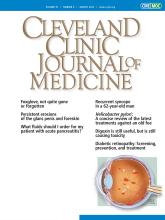ABSTRACT
Digoxin, the oldest known cardiovascular drug, is still used today to treat heart failure and atrial fibrillation. Because it has a narrow therapeutic index and multiple interactions, it frequently causes toxicity with a wide range of symptoms and cardiac arrhythmias. More importantly, elevated serum digoxin levels have been linked to a higher risk of death in patients with heart failure or atrial fibrillation, even without signs or symptoms of toxicity. This article reviews the current state of digoxin use, its pharmacologic principles, and the mechanisms, clinical presentation, and management of toxicity.
- Copyright © 2024 The Cleveland Clinic Foundation. All Rights Reserved.

Clicking the link below will connect you to begin the credit-claiming process for CME and MOC. After clicking on the link, scroll to the bottom of the page and click on “Complete the CME/MOC Process.” You will need your myCME login information to access this.
- Michael Militello, PharmD, BCPS
- Michael D. Faulx, MD⇑
- Department of Cardiovascular Medicine, Cleveland Clinic, Cleveland, OH; Professor, Cleveland Clinic Lerner College of Medicine of Case Western Reserve University, Cleveland, OH
- Address:
Michael D. Faulx, MD, Department of Cardiovascular Medicine, J2-4, Cleveland Clinic, 9500 Euclid Avenue, Cleveland, OH 44195; faulxm{at}ccf.org
ABSTRACT
Digoxin, the oldest known cardiovascular drug, is still used today to treat heart failure and atrial fibrillation. Because it has a narrow therapeutic index and multiple interactions, it frequently causes toxicity with a wide range of symptoms and cardiac arrhythmias. More importantly, elevated serum digoxin levels have been linked to a higher risk of death in patients with heart failure or atrial fibrillation, even without signs or symptoms of toxicity. This article reviews the current state of digoxin use, its pharmacologic principles, and the mechanisms, clinical presentation, and management of toxicity.
- Copyright © 2024 The Cleveland Clinic Foundation. All Rights Reserved.






